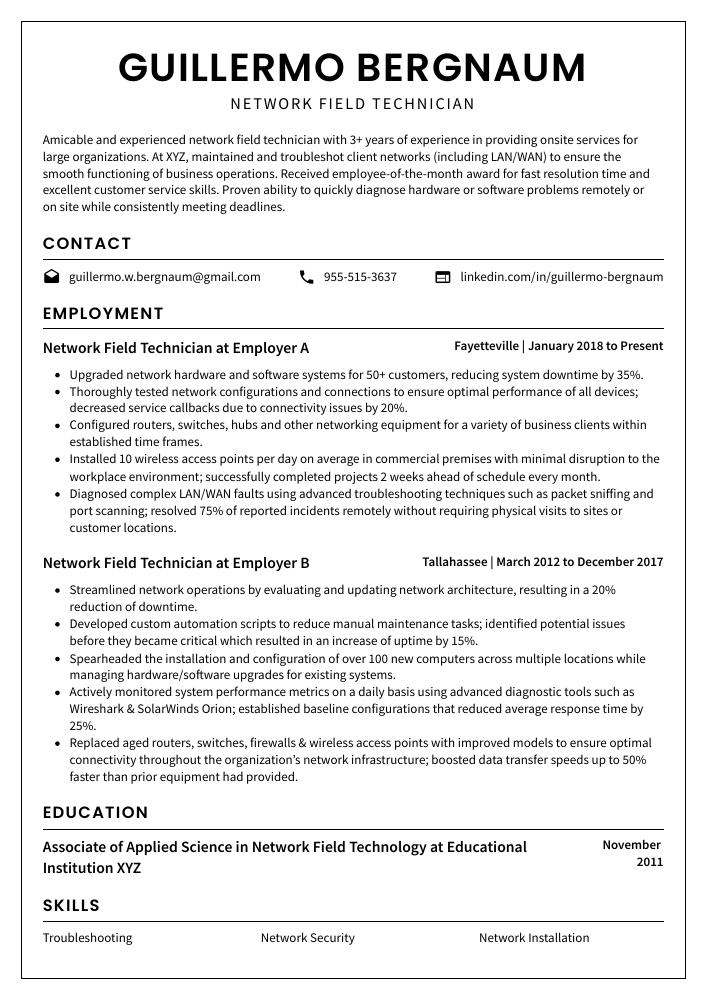Network Field Technician Resume Guide
Network field technicians install, maintain and troubleshoot computer networks in various locations. They also provide technical support to customers and configure hardware such as routers, switches, firewalls and other networking devices.
Network field technicians are in high demand, and you have the skills to fill any role. But employers don’t know who you are yet. To make them aware of your qualifications, write a resume that will get their attention.
This guide will walk you through the entire process of creating a top-notch resume. We first show you a complete example and then break down what each resume section should look like.
Table of Contents
The guide is divided into sections for your convenience. You can read it from beginning to end or use the table of contents below to jump to a specific part.
Network Field Technician Resume Sample
Guillermo Bergnaum
Network Field Technician
[email protected]
955-515-3637
linkedin.com/in/guillermo-bergnaum
Summary
Amicable and experienced network field technician with 3+ years of experience in providing onsite services for large organizations. At XYZ, maintained and troubleshot client networks (including LAN/WAN) to ensure the smooth functioning of business operations. Received employee-of-the-month award for fast resolution time and excellent customer service skills. Proven ability to quickly diagnose hardware or software problems remotely or on site while consistently meeting deadlines.
Experience
Network Field Technician, Employer A
Fayetteville, Jan 2018 – Present
- Upgraded network hardware and software systems for 50+ customers, reducing system downtime by 35%.
- Thoroughly tested network configurations and connections to ensure optimal performance of all devices; decreased service callbacks due to connectivity issues by 20%.
- Configured routers, switches, hubs and other networking equipment for a variety of business clients within established time frames.
- Installed 10 wireless access points per day on average in commercial premises with minimal disruption to the workplace environment; successfully completed projects 2 weeks ahead of schedule every month.
- Diagnosed complex LAN/WAN faults using advanced troubleshooting techniques such as packet sniffing and port scanning; resolved 75% of reported incidents remotely without requiring physical visits to sites or customer locations.
Network Field Technician, Employer B
Tallahassee, Mar 2012 – Dec 2017
- Streamlined network operations by evaluating and updating network architecture, resulting in a 20% reduction of downtime.
- Developed custom automation scripts to reduce manual maintenance tasks; identified potential issues before they became critical which resulted in an increase of uptime by 15%.
- Spearheaded the installation and configuration of over 100 new computers across multiple locations while managing hardware/software upgrades for existing systems.
- Actively monitored system performance metrics on a daily basis using advanced diagnostic tools such as Wireshark & SolarWinds Orion; established baseline configurations that reduced average response time by 25%.
- Replaced aged routers, switches, firewalls & wireless access points with improved models to ensure optimal connectivity throughout the organization’s network infrastructure; boosted data transfer speeds up to 50% faster than prior equipment had provided.
Skills
- Troubleshooting
- Network Security
- Network Installation
- Network Maintenance
- Network Configuration
- Firewall Administration
- Network Monitoring
- Wireless Networking
- Data Cabling
Education
Associate of Applied Science in Network Field Technology
Educational Institution XYZ
Nov 2011
Certifications
CompTIA Network+
CompTIA (Computing Technology Industry
May 2017
1. Summary / Objective
A resume summary/objective for a network field technician should provide the employer with an overview of your qualifications and experience. In this section, you can highlight any certifications or training courses you have taken related to networking, such as Cisco Certified Network Associate (CCNA). You could also mention how many years of experience in the industry that you have and what types of networks/systems you are familiar with. Finally, it would be beneficial to include any awards or recognition received for outstanding performance in past positions.
Below are some resume summary examples:
Accomplished network field technician with 8+ years of experience in on-site installation and maintenance for a variety of network systems. To join ABC Tech as the next Network Field Technician to provide technical support, troubleshoot customer issues, and ensure optimal performance from existing infrastructure. Proven record of reducing system downtime by 28% while providing fast response times that consistently surpass client expectations.
Committed and detail-oriented network field technician with 5+ years of experience in configuring, installing and troubleshooting networks. Experienced in testing and maintaining routers, switches & cabling systems for both residential and commercial clients. Proven track record of identifying issues quickly to ensure customer satisfaction at ABC Tech. Awarded Technician of the Year for delivering outstanding service quality during 2020.
Seasoned network field technician with 8 years of experience providing onsite technical support for large-scale network and telecom services. Skilled in troubleshooting, installations, repairs, system upgrades, and configuration changes. Proven record of successfully meeting Service Level Agreements (SLAs) at ABC Tech and reducing customer downtime by 23%. Seeking to leverage knowledge as the next Network Field Technician at XYZ Corp.
Hard-working network field technician with 5+ years of experience in troubleshooting and repairing networking equipment, computers, and software. Highly skilled at setting up networks for small to medium businesses and resolving complex network issues. At XYZ, successfully implemented a secure Wi-Fi system on site that increased customer satisfaction by 20%. Experienced in providing remote technical support via phone or email.
Driven and reliable network field technician with 5+ years of experience in the IT industry. Skilled in troubleshooting, problem solving and providing technical support for a wide range of networks and hardware systems. Experienced at installing, configuring, testing and maintaining local area networks (LANs) as well as wide area networks (WANs). CompTIA A+ certified with proficiency in Cisco IOS software configurations.
Well-rounded network field technician with 5+ years of experience in installing and configuring routers, switches, firewalls, and cabling. Skilled at troubleshooting network issues using various tools such as Wireshark. At XYZ Company implemented a new wireless infrastructure that reduced downtime by 50%. Quickly adapts to changing technology trends to keep up-to-date on best practices for networking systems.
Talented network field technician with 5+ years of experience in the installation and troubleshooting of IT infrastructure assets. Proven track record for delivering on time, within budget, and to high-quality standards. Seeking a new role at ABC Technology where I can leverage my extensive expertise building out local area networks as well as wide area networks across diverse industry locations.
Passionate network field technician with 8+ years of experience in system installation and troubleshooting. At XYZ, led the successful implementation of 20 new networks for clients across 3 countries. Certified in a variety of networking systems (Cisco, Juniper). Skilled problem solver who excels at communicating technical concepts to non-technical staff members.
2. Experience / Employment
Next comes the work history section, which should be written in reverse chronological order, meaning your most recent job is listed first.
When writing out the details of what you did at each role, use bullet points to make it easier for the reader to digest information quickly. You want to provide detail and explain the results that were achieved due to your work.
For example, instead of saying “Installed networking equipment,” you could say, “Successfully installed over 100 network switches across multiple sites within a two-month period.”
To write effective bullet points, begin with a strong verb or adverb. Industry specific verbs to use are:
- Installed
- Configured
- Troubleshot
- Monitored
- Diagnosed
- Repaired
- Upgraded
- Tested
- Replaced
- Optimized
- Documented
- Analyzed
- Resolved
- Secured
Other general verbs you can use are:
- Achieved
- Advised
- Assessed
- Compiled
- Coordinated
- Demonstrated
- Developed
- Expedited
- Facilitated
- Formulated
- Improved
- Introduced
- Mentored
- Participated
- Prepared
- Presented
- Reduced
- Reorganized
- Represented
- Revised
- Spearheaded
- Streamlined
- Structured
- Utilized
Below are some example bullet points:
- Tested, configured, and maintained LAN/WAN networks with over 6,000 end-users; successfully identified and resolved network issues to minimize downtime by 40%.
- Represented the IT department in various meetings at customer sites throughout the region; provided technical support for troubleshooting & customization of software applications as per requirement.
- Reliably installed and upgraded a variety of hardware components such as routers, switches & modems while adhering to industry standards like CCNA security protocols.
- Improved existing systems performance through regular maintenance activities including patch management on servers & other equipment which resulted in an overall system speed increase of 57%.
- Advised customers on best practices related to networking solutions that helped them reduce their costs significantly by up to $1 million annually.
- Formulated and executed effective maintenance plans for networks of up to 200+ devices, reducing downtime by 25% and increasing network speed by 15%.
- Facilitated training sessions with other technicians on new technologies and best practices; successfully trained 8 staff members in total.
- Troubleshot a variety of hardware and software issues including router configuration problems, server malfunctions and device compatibility errors; lowered helpdesk requests from customers by 35%.
- Monitored system performance metrics such as latency, bandwidth utilization & throughput for all equipment connected to the network; identified potential areas of improvement that saved $7000/year in power costs.
- Consistently maintained high-level customer satisfaction through efficient problem solving techniques while performing repairs or upgrades at client sites within agreed timelines every time; achieved a rating score of 4 out 5 based on surveys administered after each job completion.
- Assessed and resolved hardware and software network issues in over 100 businesses, increasing operational efficiency by 15%.
- Structured complex network systems for 10+ organizations to enable secure data transfer and storage; decreased system downtime from 12 hours to 2 hours on average.
- Optimized local area networks (LANs), wireless networks (WANs) & virtual private networks (VPNs) for maximum performance, resulting in a 20% increase in internet speeds across the board.
- Reduced the risk of cyber-attacks through rigorous vulnerability testing procedures that identified potential threats early; prevented $50,000 worth of financial losses due to malware intrusion incidents last year alone.
- Successfully led a team of 5 technicians during large-scale networking projects involving more than 50 servers at various client sites within 3 weeks or less per project timeline requirement.
- Documented network and system configurations thoroughly, ensuring that all changes were tracked; reduced network downtime by 30% over 3 months.
- Revised existing network architecture to optimize performance and scalability, resulting in a 60% improvement of data transfer efficiency during peak usage hours.
- Diligently troubleshot hardware & software problems with routers, switches, firewalls and other networking devices onsite or remotely; resolved 80+ technical issues within 24 hours each month for the past year.
- Presented detailed reports outlining findings from server maintenance checks to IT Managers monthly; identified security vulnerabilities before they caused disruption in service availability 4 times this quarter alone.
- Introduced new automation tools into the work environment enabling remote monitoring and control of servers without manual intervention; achieved an 85% reduction in labor costs over 6 months due to improved productivity levels.
- Meticulously troubleshot and resolved over 250 network issues in the past year, resulting in a 20% improvement of system uptime.
- Utilized advanced diagnostic techniques to identify potential causes of network malfunctions & evaluate necessary corrective actions; successfully improved customer satisfaction by 25%.
- Repaired faulty routers, switches and other hardware components across 10+ client sites while adhering to all safety regulations; reduced downtime significantly by 15 hours per week on average.
- Reorganized cabling systems for multiple business networks within tight deadlines and increased transmission speeds up to 200 Mbps with minimal disruption or service outages for clients.
- Developed preventive maintenance plans that included patch management strategies, software updates & upgrades as well as regular testing procedures; managed to reduce long-term costs by $1,500 annually for each site visited during repair visits.
- Prepared and installed more than 500 computer networks in a variety of residential and commercial environments, including troubleshooting hardware and software issues.
- Effectively maintained network performance through preventative maintenance services, resulting in an 85% decrease in customer complaints regarding slow connections or outages.
- Secured confidential data for multiple clients by developing secure firewalls, VPNs & encryption protocols; reduced the threat risk to client information by 70%.
- Achieved full certifications from leading vendors such as Juniper Networks & Cisco Systems within 3 months of hire date; completed over 100 hours of training during this period with zero missed deadlines.
- Compiled comprehensive reports on the status of all active networks which were then used to improve system security measures across each client installation; improved overall network uptime by 30%.
- Mentored 2 junior technicians in network operations and troubleshooting, resulting in a 10% increase in field efficiency.
- Accurately diagnosed and repaired more than 200+ networking faults within the assigned time frame.
- Coordinated with vendors to ensure delivery of new equipment on-time; expedited installation process by 55%.
- Expedited resolution times for customer issues by 50%, leading to improved customer satisfaction scores across all locations serviced by the team.
- Demonstrated excellent problem solving skills when resolving complex network outages, significantly reducing downtime incidents by 35%.
3. Skills
Skill requirements will differ from one employer to the next; this can easily be ascertained from the job posting. Organization A may be looking for a technician with knowledge of Cisco routers, while Organization B may be seeking someone who is familiar with Juniper switches.
It is important to tailor the skills section of your resume to each job you are applying for because many employers use applicant tracking systems these days. These computer programs scan resumes for certain keywords before passing them on to a human.
Once listed here, it’s also beneficial to discuss some of your most relevant qualifications in more detail elsewhere in the resume; this could include elaborating on technical certifications or describing how you have used specific tools and technologies throughout past projects.
Below is a list of common skills & terms:
- Data Cabling
- Firewall Administration
- Network Configuration
- Network Installation
- Network Maintenance
- Network Monitoring
- Network Optimization
- Network Security
- Troubleshooting
- Wireless Networking
4. Education
Adding an education section to your resume depends on how far into your career you are. If you just graduated and have no prior experience, mention your education below your resume objective. However, if you have been working as a network field technician for years and at multiple companies with plenty of different responsibilities to showcase, omitting the education section is perfectly fine.
If an education section is included in the resume, try to focus on courses or subjects related to networking that will be helpful for this role specifically.
Associate of Applied Science in Network Field Technology
Educational Institution XYZ
Nov 2011
5. Certifications
Certifications are a great way to demonstrate your expertise in a particular field and show potential employers that you have the necessary skills for the job. They also prove that you are actively keeping up with industry trends, as most certifications require regular renewal or completion of continuing education courses.
If you hold any relevant certifications related to the position, be sure to include them on your resume so hiring managers can see how qualified you are for the role.
CompTIA Network+
CompTIA (Computing Technology Industry
May 2017
6. Contact Info
Your name should be the first thing a reader sees when viewing your resume, so ensure its positioning is prominent. Your phone number should be written in the most commonly used format in your country/city/state, and your email address should be professional.
You can also choose to include a link to your LinkedIn profile, personal website, or other online platforms relevant to your industry.
Finally, name your resume file appropriately to help hiring managers; for Guillermo Bergnaum, this would be Guillermo-Bergnaum-resume.pdf or Guillermo-Bergnaum-resume.docx.
7. Cover Letter
Including a cover letter with your job application is an important step that shouldn’t be overlooked. It’s typically made up of 2 to 4 paragraphs and provides you with the opportunity to explain why you’re a great fit for the role, as well as providing more detail about yourself and your skillset than what’s included on your resume.
It also acts as a way to show off your personality in order to give recruiters better insights into who you are—something they can’t get from just looking at a piece of paper. Even if not required, writing one could make all the difference when it comes time for hiring decisions!
Below is an example cover letter:
Dear Jennyfer,
I am writing in response to your posting for a Network Field Technician. With more than 5 years of experience working as a network technician, I am confident I will make an immediate contribution to your organization.
In my previous role at XYZ Company, I was responsible for providing Tier 2 support for a wide range of networking issues. I troubleshot and resolved problems related to LAN/WAN connectivity, switches, routers, firewalls, and wireless networks. In addition, I provided after-hours on-call support on a rotating basis.
Through my work experience, I have developed strong problem-solving skills that enable me to quickly resolve complex technical issues. My ability to effectively communicate with non-technical users has also resulted in high levels of customer satisfaction. In addition, I have completed Cisco Certified Network Associate (CCNA) and CompTIA A+ certification courses.
I am excited about the prospect of joining your team and bringing my skills and experience to help resolve your customers’ networking issues. Please find attached a copy of my resume for your review; you can reach me anytime via phone or email should you have any questions or require additional information from me about my qualifications. Thank you for your time and consideration; I look forward to hearing from you soon!
Sincerely,
Guillermo
Network Field Technician Resume Templates
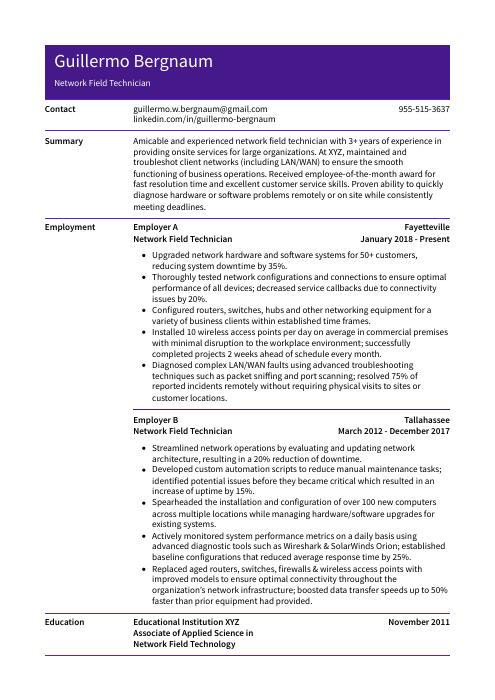 Pika
Pika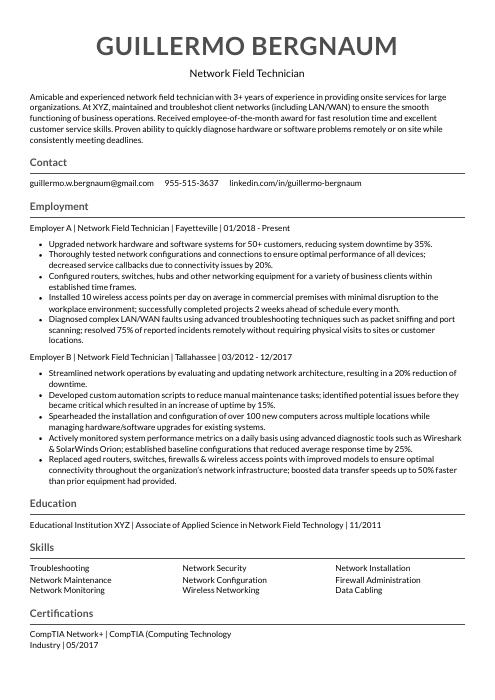 Indri
Indri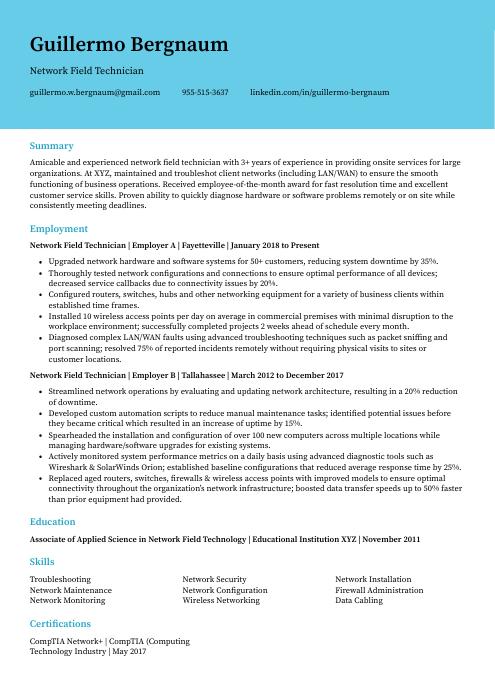 Dugong
Dugong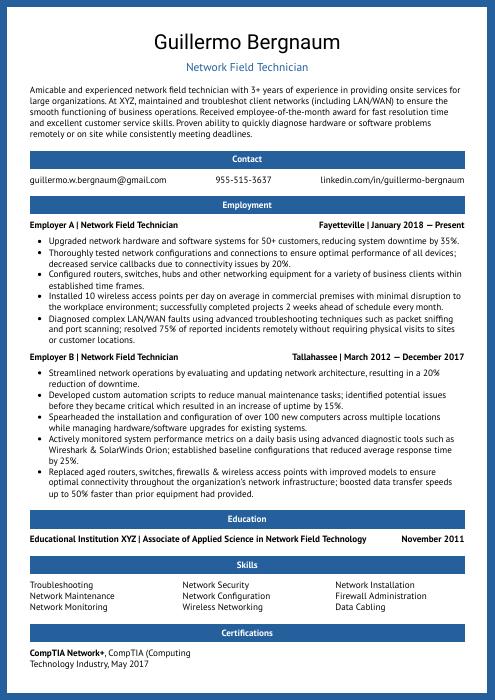 Ocelot
Ocelot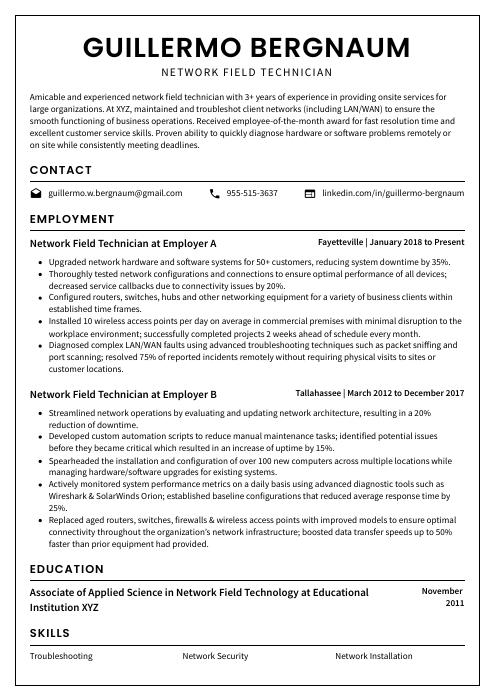 Cormorant
Cormorant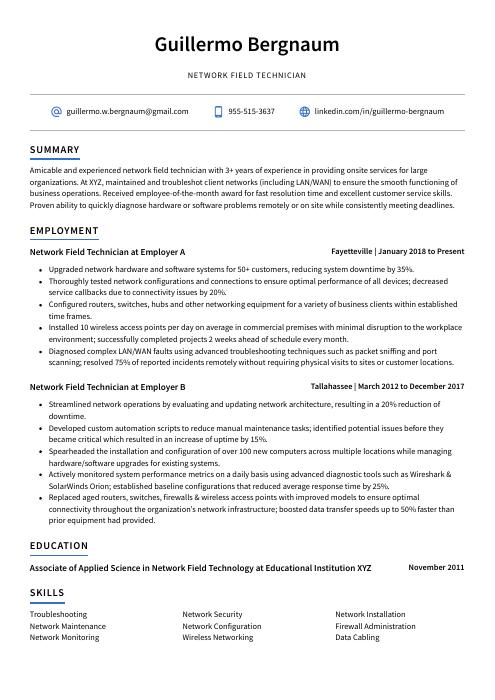 Axolotl
Axolotl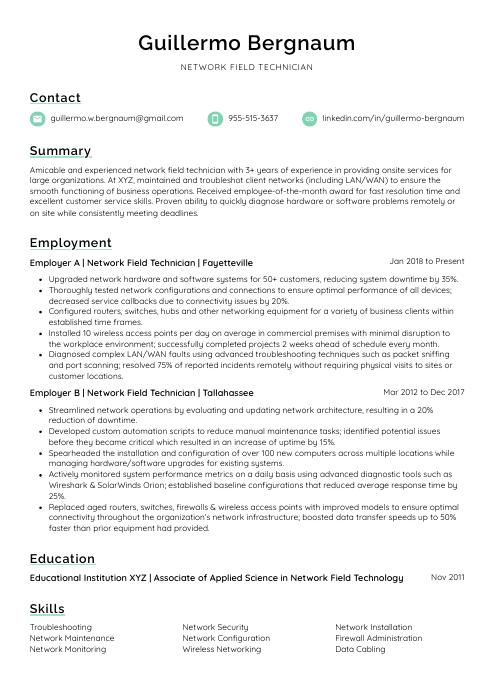 Lorikeet
Lorikeet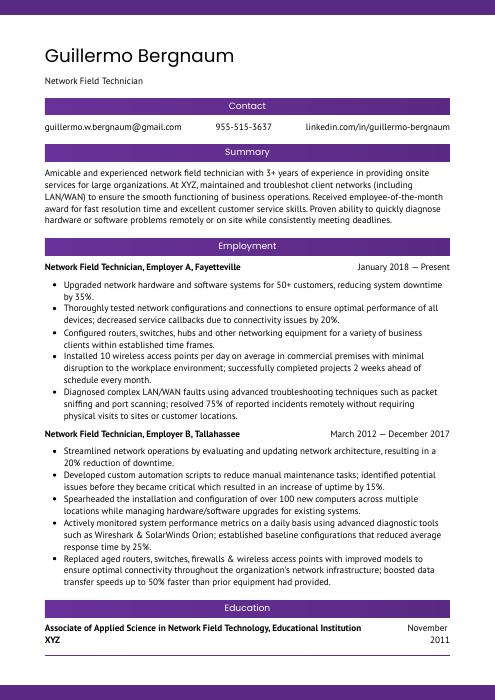 Jerboa
Jerboa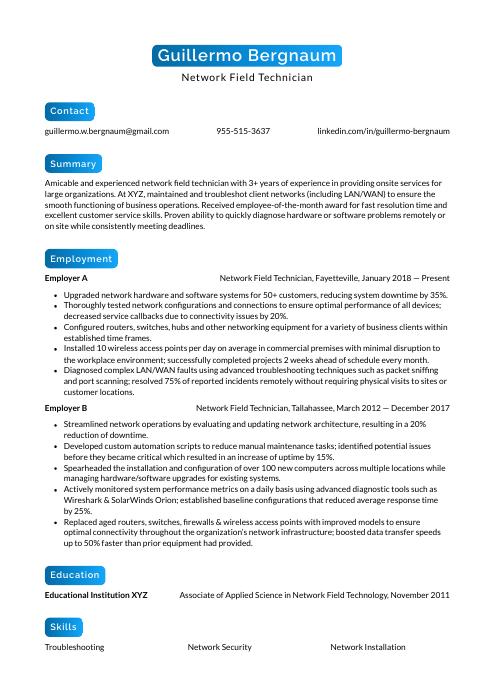 Kinkajou
Kinkajou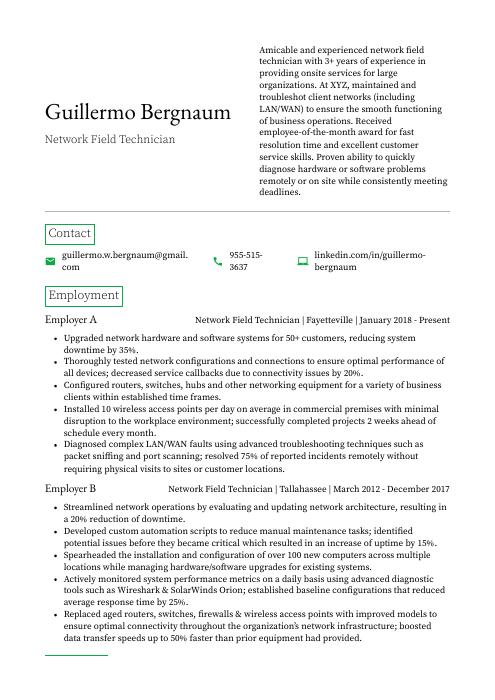 Quokka
Quokka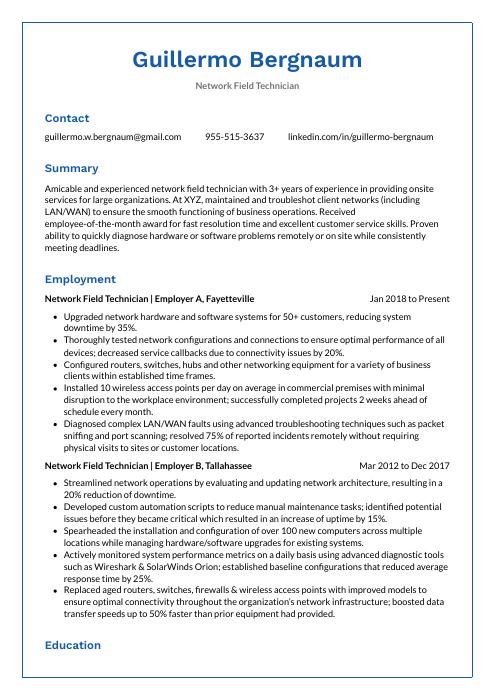 Markhor
Markhor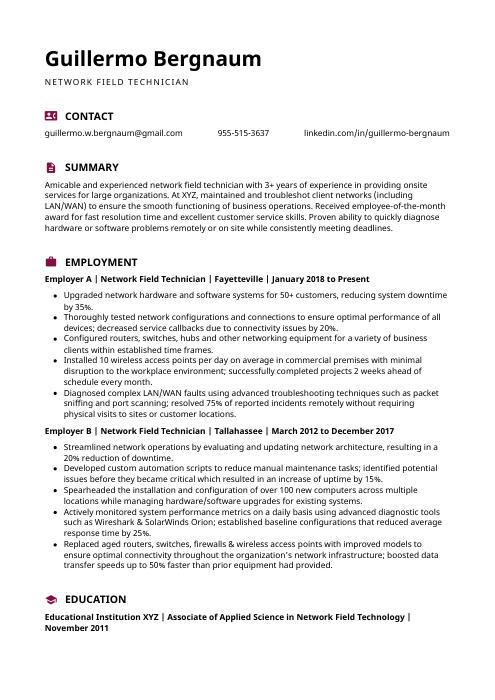 Hoopoe
Hoopoe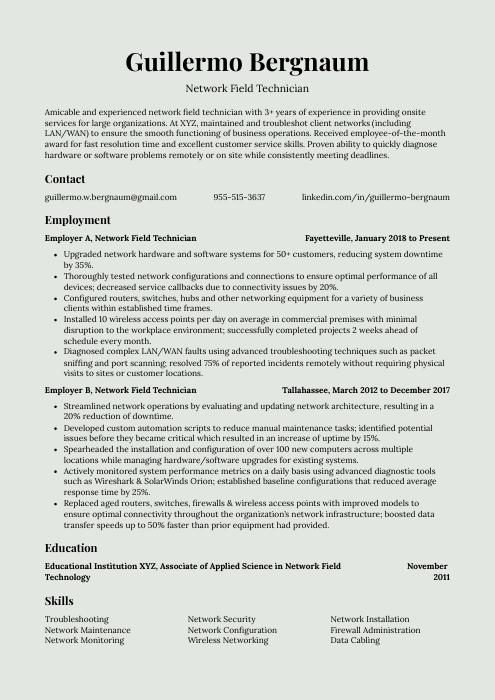 Saola
Saola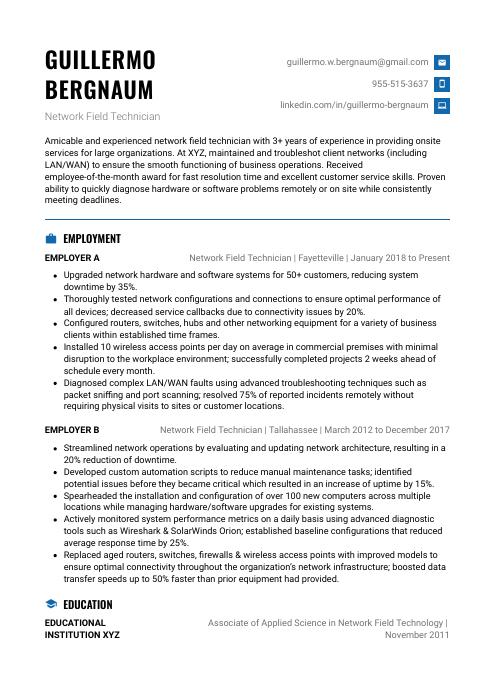 Echidna
Echidna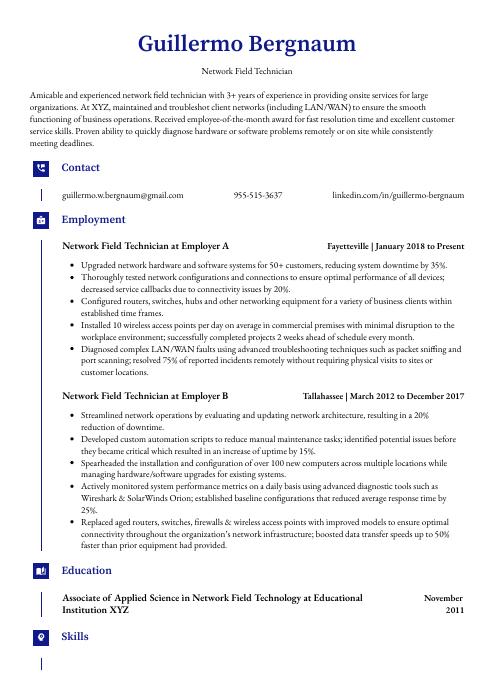 Gharial
Gharial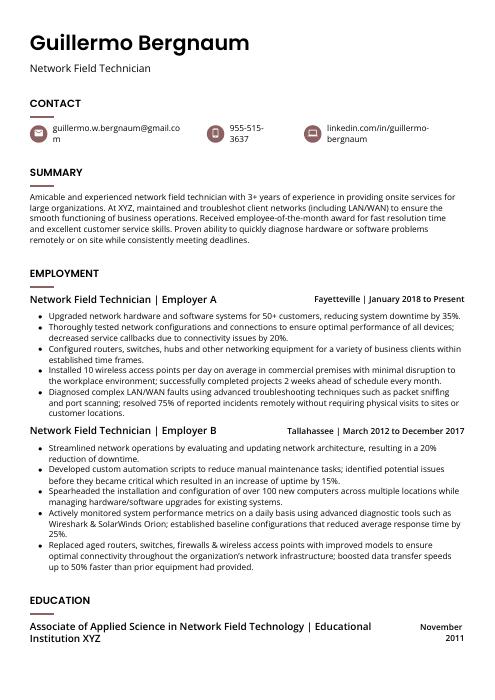 Fossa
Fossa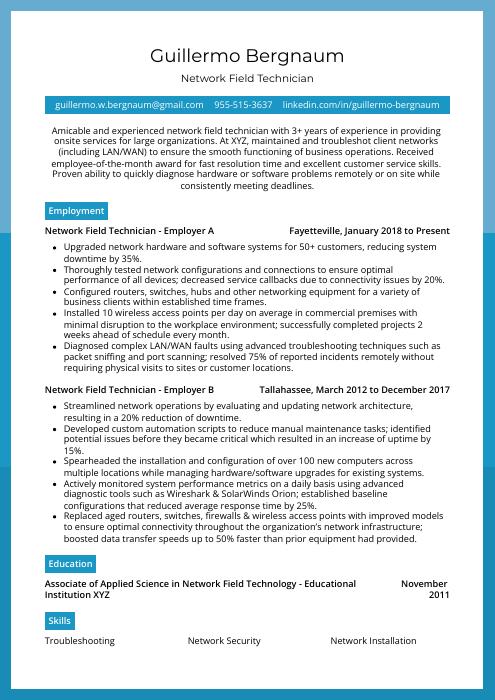 Rhea
Rhea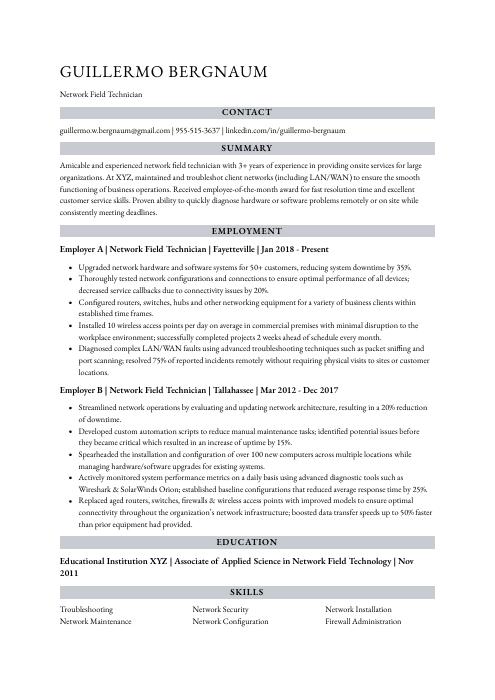 Numbat
Numbat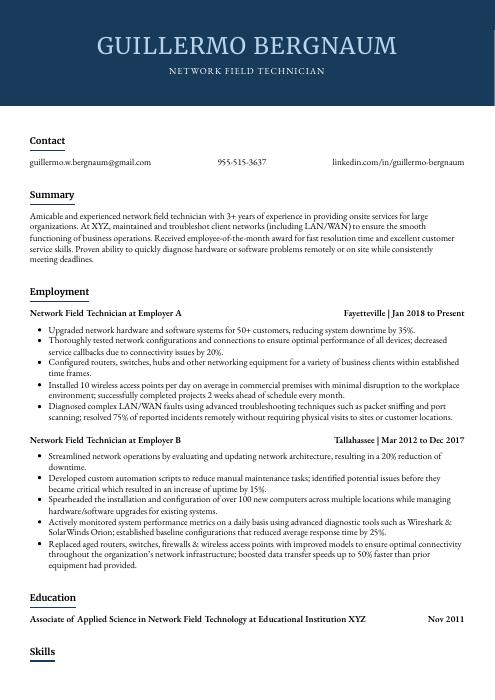 Bonobo
Bonobo Rezjumei
Rezjumei
